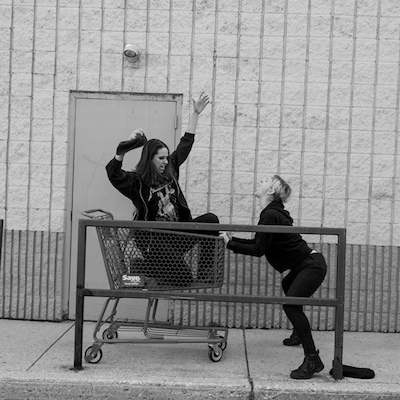INTERVIEW: Emma Goidel on Her Heavy Metal Play Local Girls

Emma Goidel
It’s been a busy season for Emma Goidel. The Philly playwright has had two new works staged within a span of four months: Her A Knee That Can Bend with Orbiter 3 opened to critical acclaim in November, and her “scream rock fantasia” Local Girls is prepping for a February 24 premiere with Azuka Theatre. We had a chance to catch up with the busy Goidel about how music plays a key role in Local Girls, the importance of producing new theater and why The Drake is changing everything.
You’ve had these two major works produced in one season. How does that feel?
It’s really exciting! It’s a year of learning what it means to be a playwright in production for me. I’m definitely not spending as much time writing, and at first I was beating myself up a bit about that, but I figured out that I’m doing a different type of writing. I’m engaging with the plays in a much more tangible way. I’m learning a lot in a very short time.
Local Girls is playing at the new Drake. What do you think of the space?
I’m totally thrilled. The Drake is so necessary for Philly. I don’t know what we would do without it. We need theaters and we need more venues. We have more and more theater companies popping up and serving audiences and there’s just not enough space to produce work. We need a space to keep up with the growing arts industry, and the Drake is doing so much to support that. The companies have done their best to make a state-of-the-art theater that’s accessible. There’s still a lot to be worked out with the space, but so far as I’m concerned it’s a beautiful home for Azuka and I am so lucky to be in the big main stage for the production. It feels like a big, big black box. That’s how the space is built; we’re not pretending that this show isn’t happening in a theater. There’s an exciting energy about the space. It feels like a hub.

Credit: AustinArt.Org. Pictured: Tabitha Allen and Mary Tuomanen
Talk to me more about the musical elements of Local Girls.
The play is about kids in a metal band. I always felt that live music had to be a part of creating the world of the play. In a play about music, one of the theatrical languages has got to be live music. I wrote the play imagining that two of the actors would hold the play with live music, just like any of the scenic elements would conjure the world for the audience. It’s been a journey to make that happen. As you can imagine, having actors be responsible for a band takes a lot of time, and we’re doing the best that we can. Two of the actors, Jahzeer Terrell and Tabitha Allen, are really game and great musicians. It’s really exciting to see them become a two-person band. Robert Kaplowitz [the music and sound designer] has been a delight to work with. We had to ask what kind of music makes the sound of the play. For me, it’s really satisfying to dig into the specificities of what kind of music holds this play, and beginning to finally understand very tangibly what it means to have two characters who are musicians and two actors who are musicians. It’s an experiment, and it isn’t extremely clear when Tabitha and Jahzeer are themselves or are the characters.
You’ve obviously become something of a champion of new plays. Why is new work important to perpetuating the genre and the art form?
In order for theater to remain relevant and meaningful, it has to evolve as we evolve. If we keep programming the hits of the ’50s and ’60s, how will we attract audiences who have moved past these works? Someone recently said this: Imagine if all of our radio stations played songs from the ’40s. Sometimes, that’s what we do in theater. We program work that is decades old that is extraordinary work, but it’s not enough to do that. We have to program forward-thinking plays to move the discipline further. As a writer, the primary way to develop your craft is through production. I could write through a script over and over again, but that’s only one of many muscles that creates a satisfying theatrical experience. We have to do that in conversation with actors and designers, to imagine something big and theatrical and meaningful. If we want to have and nurture artists to make meaningful work that understands our lives, we have to make opportunities to for them to do that on a big scale.
Local Girls runs at The Drake, February 24-March 13. For tickets and more information, click here.


